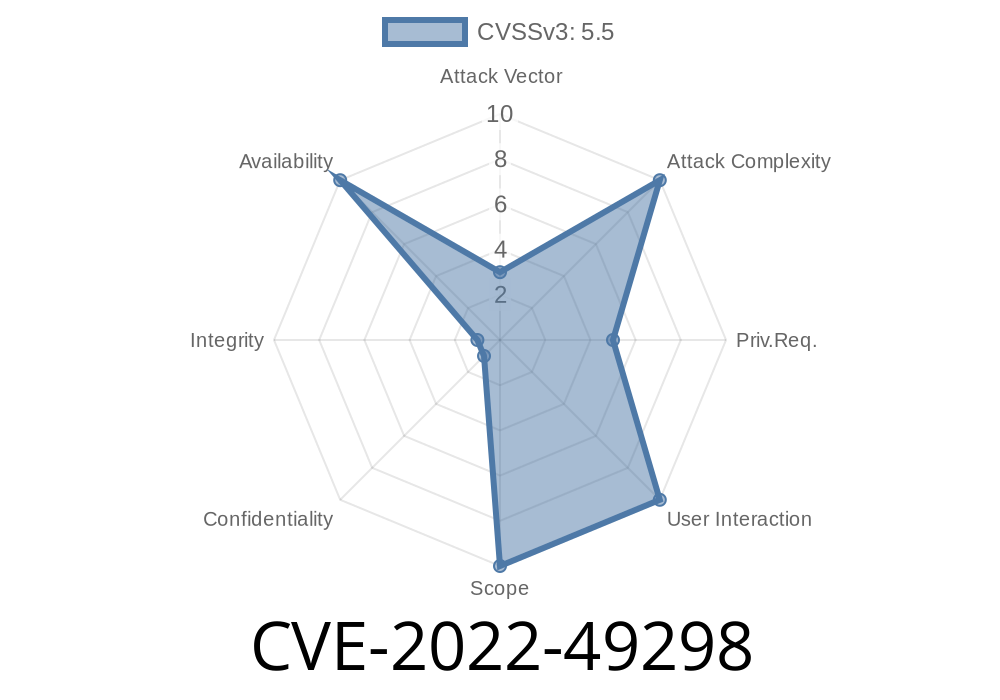In early 2022, a vulnerability was found in the Linux kernel’s Realtek 8712U USB WiFi driver (staging: rtl8712). Labeled CVE-2022-49298, this bug allowed for uninitialized memory to be used in the function r871xu_drv_init(). This use of uninitialized memory could potentially leak kernel data or crash the system in some cases, especially if the driver is probed with malicious USB wireless devices.
Below, we'll provide a deep, exclusive walkthrough of the problem, how to trigger it, and cover relevant code snippets, fixes, and exploitation possibilities.
The Problem in English
In the Realtek 8712U USB WiFi staging driver, a function called r871xu_drv_init() handled the initialization of the device, including reading the MAC address from hardware. Due to a missing check, a local buffer (mac) could remain uninitialized if a call to r8712_read8() failed (specifically when reading register EE_9346CR).
This uninitialized memory could then be used, potentially leaking kernel stack contents or causing undefined behavior, which is a security threat.
Kernel Bug Report
> KMSAN: uninit-value in r871xu_drv_init
>
> r871xu_drv_init+x2d54/x307 drivers/staging/rtl8712/usb_intf.c:541
This means an uninitialized value from the kernel stack has been used in the vulnerable function.
- Syzkaller bug report here
Let’s look at part of the code in drivers/staging/rtl8712/usb_intf.c simplified for readability
// Buffer to store the read MAC address
u8 mac[6];
// Read a hardware register into tmpU1b
tmpU1b = r8712_read8(padapter, EE_9346CR);
if (tmpU1b == ) {
// Should abort or handle error, but doesn't!
// mac is left uninitialized
} else {
// Normal path: fill mac[] with valid values
r8712_read_mem(padapter, HWADDR, mac, ETH_ALEN);
}
// ... later: use mac[]
some_function(mac); // using maybe uninitialized memory!
If r8712_read8() fails and returns , the buffer mac isn't filled out, but the code keeps using it as if it has real values. It may now contain old stack data, random bytes, or anything else—this is the vulnerability.
Because this is a driver for a USB device, an attacker could potentially
- Craft a fake or malicious USB wireless dongle using a tool like Facedancer or custom hardware
- Cause the use of uninitialized stack memory, which may
- Leak previous kernel memory back to user space via ioctl or other interfaces, exposing sensitive data
Cause a kernel crash or undefined behavior
Real-world exploitation is limited to systems where this driver is loaded, typically older/rare USB WiFi dongles, and where local physical access or USB device emulation is possible. However, in the world of virtualization and fuzzing, even drivers for obscure hardware matter.
Example Exploit Scenario
Suppose you have control over a USB device that tricks the Linux driver so that r8712_read8() returns . The kernel then uses unpredictable memory for the MAC address.
If any subsequent function copies this MAC address into a user-visible log, interface, or error response, you might leak kernel stack memory, similar to how Heartbleed worked but for the kernel.
Proof-of-Concept (Pseudo-code)
# This is not a full PoC, but illustrates the attack
# 1. Emulate a USB WiFi device (see Facedancer or similar tools).
# 2. Make the response to EE_9346CR always zero.
# 3. The driver in Linux now uses uninitialized mac[].
# 4. Get the OS to reveal this MAC in logs, error messages, or system interfaces.
Safe Handling
The patch (in kernel mainline now) ensures that when the hardware register read fails, the driver properly zeroes out or refuses to use the mac[] buffer uninitialized:
if (tmpU1b == ) {
memset(mac, , ETH_ALEN); // clear buffer!
} else {
r8712_read_mem(padapter, HWADDR, mac, ETH_ALEN);
}
Or, in a safer implementation, the driver bails out with an error so that uninitialized memory is never used.
See the patch
References
- Syzkaller bug tracker: KMSAN: uninit-value in r871xu_drv_init
- Linux kernel commit/fix
- RTL8712U driver in kernel source
Who Is Affected and What To Do
- Linux systems running the staging RTL8712U driver (rare, mostly for old/unsupported USB adapters)
- Mitigation: Update to a kernel version after the fix (~early 2023 or later). Or, remove the driver/module if not needed.
- General advice: Staging drivers are experimental; avoid them in sensitive/production systems.
Final Word
CVE-2022-49298 is a great example of how minor bugs in obscure hardware drivers can turn into security issues. Even if you don’t own a Realtek 8712U dongle, this flaw highlights the importance of proper memory initialization, especially in kernel code running with high privileges.
If you're a distro packager, kernel developer, or security team, make sure all memory is initialized—always! Otherwise, you might end up in someone’s writeup just like this.
*Content by Linux security enthusiast. Exclusive, simple, and tailored for the community.*
Have questions? Want to see a PoC or detailed walkthrough on emulating USB devices? Drop a comment below!
Timeline
Published on: 02/26/2025 07:01:06 UTC
Last modified on: 04/14/2025 20:08:32 UTC
